|
|
|
Sort Order |
|
|
|
Items / Page
|
|
|
|
|
|
|
| Srl | Item |
| 1 |
ID:
095301
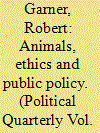

|
|
|
|
|
| Publication |
2010.
|
| Summary/Abstract |
In orthodox moral thinking in the West, animals count for something but human interests take precedence. It is argued that this moral orthodoxy or animal welfare position is flawed. It fails to take into account that some animals, like humans, are persons and that some, so-called 'marginal' humans lack personhood. More importantly, although it is likely that animals do not have an interest in liberty for its own sake and have less of an interest in continued life than humans, there is little justification for the animal welfare claim that an animal's suffering should be regarded as less important morally than that of a human. It is concluded that the adoption of a 'sentiency position', whereby animals have a right not to suffer, has radical implications for the way animals are treated, ruling out intensive forms of animal agriculture and those scientific procedures that inflict suffering as morally illegitimate.
|
|
|
|
|
|
|
|
|
|
|
|
|
|
|
|
| 2 |
ID:
095286
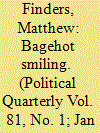

|
|
|
|
|
| Publication |
2010.
|
| Summary/Abstract |
The MPs expenses scandal that erupted in May 2009 has certainly rekindled interest in the next stage of constitutional reform and democratic renewal in Britain. This article examines how Gordon Brown's tenure as Prime Minister has differed from Tony Blair's in relation to the 'new politics' narrative. It argues that despite his long-term personal commitment to major constitutional reforms, the role of crises in recalibrating the political opportunity structure and the manner in which electoral incentives can alter elite attitudes to institutional change that Brown's tenure can be characterised by optimism followed by timidity. Gordon Brown may have flown a few kites in relation to a written constitution, electoral reform, English devolution and the future of the House of Lords but he has left things far too late for a 'constitutional moment'. Brown may have the political inclination but he lacks the capacity to deliver far-reaching reform; Cameron is likely to have the capacity but not the inclination.
|
|
|
|
|
|
|
|
|
|
|
|
|
|
|
|
| 3 |
ID:
095302


|
|
|
|
|
| Publication |
2010.
|
| Summary/Abstract |
Better Government for Older People: this ambitious project to involve older citizens in the improvement of policies affecting them, celebrated its tenth anniversary in 2008. Then the Government decided to close it down, setting up an Advisory Forum as an alternative. BGOP's considerable achievements were widely recognised (and acknowledged in the DWP review by John Elbourne) but there were real shortcomings. BGOP's previous history is summarised, with special reference to its work with the Older People's Advisory Group. Some activists and observers believe BGOP's weaknesses could and should have been remedied, but the Government decided to start again. There are strongly opposed interpretations of why this happened. Former BGOP staff and OPAG members have since set up ChangeAGEnts, a Co-operative charity, to continue their work. The specific issue is intrinsically and demographically important, but it also throws light on consultation in many other policy areas.
|
|
|
|
|
|
|
|
|
|
|
|
|
|
|
|
| 4 |
ID:
095288
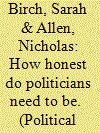

|
|
|
|
|
| Publication |
2010.
|
| Summary/Abstract |
This article reports findings from a recent survey of citizens' attitudes towards standards in British public life. It provides further evidence that people hold their political leaders to high standards, yet are often disappointed by the reality, and suggests that many citizens tend to blame the practice and institutions of politics for making politicians less honest and trustworthy than they would ideally like. The article argues that reforms to the political system are needed to regain the confidence of the population, but that the manner in which the most recent round of ethics reforms in the House of Commons were introduced may lower the prospects of their achieving this goal.
|
|
|
|
|
|
|
|
|
|
|
|
|
|
|
|
| 5 |
ID:
095294
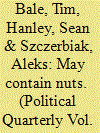

|
|
|
|
|
| Publication |
2010.
|
| Summary/Abstract |
The British Conservative Party's decision to leave the European Peoples' Party-European Democrats (EPP-ED) group in the European Parliament and establish a new formation-the European Conservatives and Reformists (ECR)-has attracted criticism, much of it focused on the supposedly extremist politics and character of the partners with which the Conservatives have chosen to work. In fact, while those parties which have joined the Conservatives in the new group are for the most part socially conservative, they are less extreme and more pragmatic than their media caricatures suggest. Moreover, such caricatures obscure some interesting incompatibilities within the new group as a whole and between some of its Central and East European members and the Conservatives, not least with regard to their foreign policy preoccupations and their by no means wholly hostile attitude to the European integration project.
|
|
|
|
|
|
|
|
|
|
|
|
|
|
|
|
| 6 |
ID:
095283
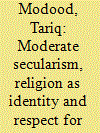

|
|
|
|
|
| Publication |
2010.
|
| Summary/Abstract |
Political secularism takes many forms but a fundamental distinction is between radical and moderate kinds. The latter is a genuine secularism and not just a failure to take secularism to its logical conclusion. The failure to appreciate this obscures the secularism that exists in western Europe. Namely, an accommodation of organised religion which sees it as a potential public good or national resource (not just a private benefit), which the state can in some circumstances assist to realise-even through an 'established' church. I adumbrate five types of reasons the state might be interested in religion: truth, danger, utility, identity and respect. The challenge facing such secularism today is whether it can be pluralised or multiculturalised, in particular whether it can accommodate Muslims. A ground for optimism is the respect that some people, especially some Muslims, have for religions other than their own.
|
|
|
|
|
|
|
|
|
|
|
|
|
|
|
|
| 7 |
ID:
095284


|
|
|
|
|
| Publication |
2010.
|
| Summary/Abstract |
Anthony Lester tackles the complex and sensitive issues of multiculturalism and free speech. He explores the various meanings given to multiculturalism, integration and assimilation, as well as the relationship between the right to equality and dignity for ethnic and religious minorities and the right to freedom of expression. Placing our multicultural society in its historical context, he considers the treatment of Commonwealth immigrants in the 1960s and 1970s and discusses more recent confrontations involving racial or religious groups which have raised the right to free speech. He argues that our approach to integration and cultural diversity should promote equality and individuality but resist unreasonable demands to respect customs and practices which, for example, harm the rights of women and children, in the name of misguided multiculturalism. We must guard against political correctness that panders to the thin-skinned but remember that the right to offend does not mean a duty to do so.
|
|
|
|
|
|
|
|
|
|
|
|
|
|
|
|
| 8 |
ID:
095299


|
|
|
|
|
| Publication |
2010.
|
| Summary/Abstract |
This article summarises the results so far of an international investigation aimed at identifying political strategies that make it easier for national governments to take more effective action against climate change while avoiding significant political damage. The numerous strategic options identified included strategies involving unilateral action by governments, strategies of persuasion, damage limitation strategies, strategies that can be used in political exchange with other political actors, and strategies designed to improve the bargaining position of governments by altering the terms of political exchange. The article concludes with a shortlist of especially promising strategies.
|
|
|
|
|
|
|
|
|
|
|
|
|
|
|
|
| 9 |
ID:
095300
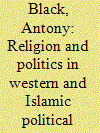

|
|
|
|
|
| Publication |
2010.
|
| Summary/Abstract |
Early Christianity viewed religion and politics as largely separate; early Islam viewed them as largely concurrent. But from the eighth to the eleventh centuries each modified their original position, so that they almost converged. However, they subsequently diverged again. This was because, in the West, political thought became secularised following the eleventh-century papal reform movement and then the Protestant Reformation. Muslim thinkers, on the other hand, beginning with al-Mawardi (974-1058), sought to restore the subsumption of politics into religion, notably during the sixteenth-century Shi'ite revolution in Iran. While today the West views religion and politics as largely separate categories, Muslims see them as necessarily intertwined; attempts to separate them have so far largely failed. Hence Muslim political thought is based primarily on revelation (interpreted in various ways), while Western political thought is based on philosophy.
|
|
|
|
|
|
|
|
|
|
|
|
|
|
|
|
| 10 |
ID:
095292
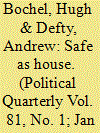

|
|
|
|
|
| Publication |
2010.
|
| Summary/Abstract |
Social policy is of key importance to contemporary society, accounting for two thirds of public expenditure and, through provision such as the NHS, pensions, benefits, schools, universities and social care, touching on the lives of much of the population on a daily basis. It has also been one of the areas where the Conservative party have sought to change their image, and to some extent policies, under David Cameron. Drawing upon a range of evidence, including interviews with more than ten per cent of the House of Commons and the House of Lords, this article examines the potential challenges for a Conservative government of either stance, focusing on the extent of possible support for the Conservatives' approach to social policy amongst three key groups: the public, MPs, and members of the House of Lords.
|
|
|
|
|
|
|
|
|
|
|
|
|
|
|
|
| 11 |
ID:
095287
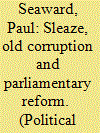

|
|
|
|
|
| Publication |
2010.
|
| Summary/Abstract |
There is nothing new about the existence of a political class, nor about the electorate's distaste for paid politicians. In the middle ages, voters made clear their preference for representatives who were prepared to serve without payment; in the eighteenth century, the increase in the number of MPs paid by the state, whether in salaried posts or as sinecurists, was seen as a corrupt and pernicious extension to the influence of the crown; in the nineteenth and early twentieth century the payment of MPs by the taxpayer was widely regarded as an improper and offensive idea. The current furore over MPs' pay and expenses is another example of the intense suspicion with which MPs who have received money from the state have been regarded from the seventeenth to the twentieth century.
|
|
|
|
|
|
|
|
|
|
|
|
|
|
|
|
| 12 |
ID:
095285


|
|
|
|
|
| Publication |
2010.
|
| Summary/Abstract |
The banking crisis of 2007-2008 briefly threatened to overturn a system of market government that had lasted for nearly three decades-a system designed to minimise democratic control over markets. The crisis drew politicians once more into financial politics and exposed bankers and banking institutions to popular criticism and control. But the development of regulatory debates, and of the institutions designed to manage the crisis, have combined to avert this threat to the established order. The crisis is being 'wasted': it is failing to produce radical reforms. The paper establishes the intellectual and institutional origins of this failure, and argues that, while the reform window is closing, it is not yet fully shut: there exists yet scope for radical argument and popular mobilisation in the creation of a financial system with fewer pathological features.
|
|
|
|
|
|
|
|
|
|
|
|
|
|
|
|
| 13 |
ID:
095297
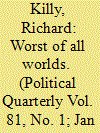

|
|
|
|
|
| Publication |
2010.
|
| Summary/Abstract |
At the 2009 European elections, Britain again elected its MEPs under the 'closed list' system of proportional representation (PR)-the third time it had done so since 1999. This article looks at claims that these elections vindicated PR by producing a 'fairer' relationship between the parties' share of votes and their share of seats, a truer reflection of diverse political allegiance in modern Britain, and (thanks to multi-member constituencies) a more efficient and sensitive system for representing voters. However, the article will also inspect the idea that the case for electoral reform was gravely weakened by the 2009 Euro elections. It will recall how PR again failed to boost turnout, again employed a method of counting that most voters did not understand, and again involved constituencies too large for meaningful representation. Furthermore, it will recall that PR allowed the election of two MEPs from the far-right British National Party. (With just 6% of votes, it is unlikely that the BNP would have secured seats under Britain's traditional electoral system.) The article will argue that, as a result, PR has had a centrifugal effect on the British party system and, potentially, a polarising effect on our political culture. Consequently, the article will assert that, owing to the success of the BNP in 2009, arguments about PR for Westminster have been 'ideologically neutralised'. The article will thus suggest that we can now take a more objective view of hung Parliaments and coalitions (the likely effects of PR at general elections), free from the assumption that they entrench centrist governments and progressive politics.
|
|
|
|
|
|
|
|
|
|
|
|
|
|
|
|
|
|
|
|
|